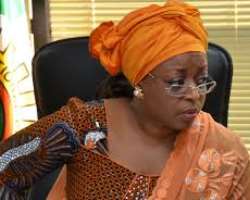EFCC seizes Diezani's $18m Asokoro, Abuja home

The Economic and Financial Crime commission has seized a mansion in the Asokoro area of thr Federal Capital Territory valued at $18 million said to be belonging to former minister of Petroleum,Mrs Diezani Alison-Madueke.
The house is is fitted with state-of-the-art facilities including furniture and a gym that is fully bullet proof in addition to expensive jewelries and huge sums of money.
EFCC boss Ibrahim Magu, who spoke in an interview with Al-Jazeera, a Qatar-based news network, explained that the house was part of the $10bn in cash and assets that had been seized by the Federal Government in the last one year.
“We have been able to take on a lot of big shots that were hitherto untouchable in the three arms of the military, political class. We have recorded 164 convictions in just one year” , Magu said
Photo: Diezani Alison-Madueke, very beautiful and highly cerebral was Nigeria's oil minister during former president Goodluck Jonathan's administration.Her tenure was marked with allegations of large scale corruption.
The EFCC helmsman also disagreed with those who said the anti-corruption war is selective and politically motivated stating that: “No! Not my EFCC, not the EFCC of today. We are not politicised. If there is an allegation against anybody, we will go after them.”
The commission had revealed in April that it seized wristwatches worth £2m from the wife of the Chairman of Atlantic Energy Drilling Concepts Nigeria Limited, Mr. Jide Omokore, and Diezani.
The anti-graft agency seized a wristwatch worth £1.4m from Omokore's wife, while a wristwatch worth £600,000 was seized from Diezani.
The wristwatches were said to have been seized during various raids on houses of some suspects on Banana Island, Ikoyi, Lagos, and other places.
Meanwhile, in a statement on Monday, the spokesman for the EFCC, Mr. Wilson Uwujaren, said the commission had the right to seize properties believed to have been acquired with stolen funds.
He said, “In recent times, a lot of interest has been generated by the action of the commission in freezing the accounts of suspects that were investigated or are currently being investigated. Some commentators have tended to ascribe vindictive motives to this action.
“In order to prevent misinformation, it is imperative to explain the reason behind the commission's actions in this regard. Freezing of accounts suspected of being used for commission of financial crimes is a mandatory investigative step backed by law.
“Indeed, Section 34 (1) of the EFCC Act 2004 empowers the commission to freeze any account suspected of being used for financial crimes.
“The section stipulates that 'the chairman of the commission or any officer authorised by him may, if satisfied that the money in the account of a person is made through the commission of an offence under this Act or any enactment specified under Section 6(2) (a)-(f) of this Act, apply to the court exparte for power to issue or instruct a bank examiner or such other appropriate authority to freeze the account.”
He argued that the aim of these provisions was to ensure that the commission safeguarded suspected proceeds of crime pending the completion of its investigation.

